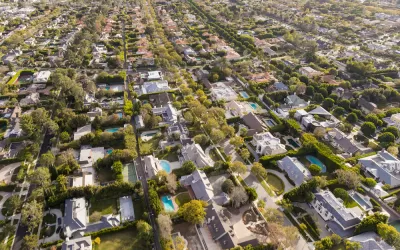Los Angeles is the latest city to adopt a "linkage fee" that charges new development to generate funding for affordable housing, joining cities like Seattle, Chicago, and San Jose.

"The Los Angeles City Council voted Wednesday to impose a new fee on development to raise millions of dollars a year for affordable housing as the city copes with rising rents and surging homelessness," reports Dakota Smith.
"Under the measure, builders will pay $1 to $15 a square foot, depending on the type of project and area, with higher fees in 'high-market' neighborhoods, including the Westside, and lower fees in areas that include San Pedro and South L.A.," according to Smith. Policy makers hope the new fee will generate $100 million every year after it goes into affect in 2019. More detail on how the fee works is included in the article.
The proposed "linkage fee" has been a subject of political debate for several years in Los Angeles, but the vote now comes as a victory for Mayor Eric Garcetti. The mayor has advocated for the linkage fee as a new permanent source of revenue for affordable housing projects.
Mayor Garcetti's comments after the approval of the new linkage fee seems to play two sides of the development politics debate: those in favor of growth and those concerned about gentrification as a result of new development. "Today we see hope in the promise that Los Angeles can continue to grow and indeed must grow….That when we see luxury condominiums going up, that we can make sure that there is money paid in to build housing for the rest of us," said Mayor Garcetti, as quoted in the article.
The new fee is unpopular with developers in the city, who say the new expense will most likely be passed down to renters. Others have argued that more fees are likely to slow or halt development altogether, making the fee ineffective for its own purposes.
FULL STORY: L.A. City Council approves development fee to raise money for affordable housing

Planetizen Federal Action Tracker
A weekly monitor of how Trump’s orders and actions are impacting planners and planning in America.

Restaurant Patios Were a Pandemic Win — Why Were They so Hard to Keep?
Social distancing requirements and changes in travel patterns prompted cities to pilot new uses for street and sidewalk space. Then it got complicated.

Map: Where Senate Republicans Want to Sell Your Public Lands
For public land advocates, the Senate Republicans’ proposal to sell millions of acres of public land in the West is “the biggest fight of their careers.”

Maui's Vacation Rental Debate Turns Ugly
Verbal attacks, misinformation campaigns and fistfights plague a high-stakes debate to convert thousands of vacation rentals into long-term housing.

San Francisco Suspends Traffic Calming Amidst Record Deaths
Citing “a challenging fiscal landscape,” the city will cease the program on the heels of 42 traffic deaths, including 24 pedestrians.

California Homeless Arrests, Citations Spike After Ruling
An investigation reveals that anti-homeless actions increased up to 500% after Grants Pass v. Johnson — even in cities claiming no policy change.
Urban Design for Planners 1: Software Tools
This six-course series explores essential urban design concepts using open source software and equips planners with the tools they need to participate fully in the urban design process.
Planning for Universal Design
Learn the tools for implementing Universal Design in planning regulations.
Heyer Gruel & Associates PA
JM Goldson LLC
Custer County Colorado
City of Camden Redevelopment Agency
City of Astoria
Transportation Research & Education Center (TREC) at Portland State University
Camden Redevelopment Agency
City of Claremont
Municipality of Princeton (NJ)




























